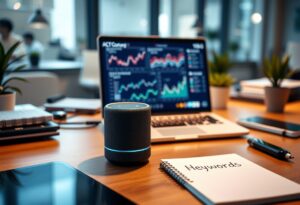Marketing today has transformed significantly with the integration of artificial intelligence (AI). I often see how AI enhances targeting accuracy, allowing you to reach your ideal audience more effectively. However, I also recognize the risks associated with over-reliance on technology, such as potential data privacy concerns. On the other hand, the efficiency gains in automating campaigns and understanding consumer behavior are undeniable. In this post, I will explore how you can harness AI in digital marketing while being aware of its challenges and advantages.
Key Takeaways:
- Personalization: AI technology allows for the creation of highly personalized marketing campaigns based on user behavior, preferences, and interactions.
- Data Analysis: AI can process vast amounts of data to uncover insights and trends, optimizing marketing strategies and enhancing decision-making.
- Automation: Automated tools powered by AI streamline repetitive tasks, enabling marketing teams to focus on creative and strategic initiatives.
- Improved Targeting: AI enhances audience segmentation, allowing marketers to precisely target their campaigns and improve conversion rates.
- Predictive Analytics: By utilizing predictive models, AI helps forecast customer behavior and market trends, aiding in proactive marketing efforts.
The Role of AI in Data Analysis
For digital marketers, AI plays a transformative role in data analysis, enabling you to sift through vast amounts of information and derive actionable insights. By automating the process of data analysis, AI helps improve the accuracy and speed of your marketing strategies, allowing you to make informed decisions that enhance your customer engagement and conversion rates.
Predictive Analytics
Beside aiding in data interpretation, AI-driven predictive analytics empowers you to forecast consumer behavior effectively and make data-backed decisions. With the ability to analyze past trends and customer preferences, you can be proactive, allowing your strategy to adapt with confidence (this means you can allocate resources more efficiently).
Customer Segmentation
To achieve effective marketing campaigns, AI facilitates precise customer segmentation tailored to your audience’s needs. By utilizing machine learning algorithms, you can identify specific customer groups based on behavior, preferences, and demographics, which allows for personalized communication and marketing efforts. This tailored approach not only boosts engagement but also increases conversion rates as your campaigns resonate more profoundly with your audience.
The power of AI in customer segmentation cannot be overstated. With refined categorization, you can identify high-value customers while avoiding overspending on less effective marketing strategies. However, it’s necessary to be vigilant about data privacy and ensure compliance with regulations to prevent potential pitfalls. Overall, leveraging AI for customer segmentation streamlines your efforts, providing a promising pathway for achieving greater market reach and efficiency.
Personalization and Customer Experience
Some of the most impactful advances in digital marketing today revolve around personalization and the overall customer experience. By leveraging AI technologies, marketers can create tailored experiences that resonate with individual preferences and behaviors. This not only fosters deeper connections with audiences but also drives higher engagement rates and conversions, ultimately contributing to enhanced customer loyalty and satisfaction.
Dynamic Content Creation
Before AI, creating personalized content was a time-consuming challenge. However, with the advent of AI, content can be dynamically generated in real-time based on user behavior and preferences. This allows marketers to serve the most relevant and engaging material to each user, making the experience more enjoyable and effective. As a result, you are more likely to see increased interactions and improved customer satisfaction.
Chatbots and Virtual Assistants
Chatbots are transforming the way businesses engage with customers by providing instant support and improving interaction. These AI-powered tools can handle a wide range of inquiries, enabling you to address customer needs efficiently, enhancing your service offering. Moreover, they can engage multiple users simultaneously, ensuring that no one feels neglected.
Also, AI-powered chatbots significantly enhance customer interaction by providing immediate responses, which reduces wait times and increases user satisfaction. They can gather data on user preferences and behaviors, enabling an even more responsive and tailored experience in the future. However, it’s necessary to keep in mind that while chatbots are beneficial, they should not completely replace human interaction, as genuine human connection still plays a vital role in customer experience. Embracing AI in your digital marketing strategy can ensure you’re able to meet customer expectations while also maximizing operational efficiency.
Enhancing Marketing Automation
Once again, AI is revolutionizing marketing automation by streamlining processes and optimizing strategies. By integrating AI technology into your marketing workflows, you can achieve greater efficiency and focus on more strategic decisions. AI tools can automate repetitive tasks while producing insights that help drive marketing efforts. This not only saves you time but also enhances the overall effectiveness of your campaigns.
Campaign Optimization
On the path to success, using AI for campaign optimization allows you to automatically refine and improve your marketing strategies for better performance. AI analyzes real-time data to make immediate adjustments based on audience behavior, ensuring that your messaging and targeting remain relevant. (It’s important to invest wisely in AI tools that offer these capabilities to maximize returns.)
Lead Scoring
Lead scoring is an area where AI shines, as it effectively prioritizes leads based on their likelihood to convert, subsequently boosting your sales efficiency. By assessing various metrics and behavioral data, AI algorithms can identify and rank potential customers, helping you allocate resources more effectively.
It’s worth noting that AI-powered lead scoring can significantly enhance your sales strategy by pinpointing the most promising leads in your pipeline. This ensures that your team focuses their efforts on those most likely to convert, ultimately driving higher sales rates. However, relying solely on AI without human intuition could introduce risks, as understanding your audience’s unique needs remains vital for long-term relationship building.
The Impact of AI on SEO
Not only has AI transformed digital marketing, but it has also reshaped search engine optimization (SEO) strategies. By leveraging advanced algorithms, AI enhances content relevance and improves organic search rankings. This evolution makes it imperative for marketers to adapt their approaches to remain competitive in the online marketplace.
Algorithm Adaptation
On one hand, AI technologies continuously learn and adapt to the ever-changing SEO algorithms presented by search engines. By analyzing user behavior and search patterns, AI can optimize content to align with these shifts, resulting in improved search visibility. As a marketer, this means staying ahead of the curve by utilizing AI tools that help inform your strategies.
Voice Search Optimization
By utilizing AI, I can better optimize content for voice search queries, which are becoming increasingly popular due to changing consumer habits. Voice searches often involve more conversational language, making it important to adjust content accordingly. (Investing in voice search optimization is imperative for your strategy moving forward.)
Another area of significance is understanding that voice search is not just a fad; it has become a fundamental part of consumer interactions online. You must consider how voice search affects your SEO tactics. Utilizing long-tail keywords and natural language will improve your content’s performance in voice search results. (Incorporating voice search strategies can greatly enhance your brand’s visibility and audience engagement.)
AI Ethics and Challenges
Keep in mind that the integration of AI in digital marketing brings with it ethical concerns and challenges that must be thoroughly examined. You can explore more on these complexities in AI in Digital Marketing: Strategies & Case Studies. It is necessary to balance innovation with ethical considerations to ensure responsible marketing practices moving forward. Moreover, digital marketers must develop critical leadership qualities for digital marketers, enabling them to navigate these ethical dilemmas effectively. These qualities include empathy, transparency, and a commitment to social responsibility, which are essential for fostering trust among consumers. As AI continues to evolve, cultivating such leadership will be vital in shaping a marketing landscape that prioritizes not only innovation but also integrity.
Data Privacy Concerns
An increasing reliance on AI for personalizing content raises significant data privacy issues. The collection and utilization of customer data must comply with regulations and ethical guidelines (marketers must prioritize transparency and consent). Maintaining consumers’ trust is paramount in navigating these challenges effectively.
Over-reliance on Automation
The landscape of digital marketing can become problematic if there is an over-dependence on automation brought by AI tools, which may risk diminishing the importance of human creative insight. Relying solely on AI can limit your brand’s ability to connect emotionally with your audience, which is necessary for building lasting relationships. Without human oversight, decision-making can become rigid, meaning that trends and shifts in consumer sentiment might not be adequately addressed.
Challenges arise when you place too much trust in AI-driven automation. While these tools provide efficiency and scalability, over-reliance can lead to missed opportunities for authentic engagement and creative strategies that are only born through human experience. Furthermore, automated decisions may not adapt well to changing market conditions, potentially resulting in misaligned messaging that fails to resonate with your target audience. Therefore, ensuring a healthy balance between AI efficiency and human intuition is vital for achieving success in digital marketing. Investing in training and ongoing development for your team can help maintain this balance, allowing for the seamless integration of data-driven insights while fostering creativity and human connection. By leveraging the automation benefits in digital marketing, businesses can streamline processes and enhance targeting, but must remain vigilant about maintaining the human touch that builds brand loyalty. Ultimately, a hybrid approach that embraces both innovative technology and human creativity will yield the most effective results in engaging audiences.

Future Trends in AI and Digital Marketing
Despite the rapid evolution of technology, the integration of AI into digital marketing strategies is set to accelerate significantly in the coming years. Marketers will leverage AI’s capabilities to deliver personalized content and enhance customer engagement, while also utilizing predictive analytics to anticipate consumer behavior. As we navigate this landscape, investing in AI-driven tools will be important for maintaining a competitive edge in your business (prioritize adapting to these technologies).
Integration with Emerging Technologies
To maximize the impact of your marketing efforts, look at blending AI with emerging technologies like AR/VR and the metaverse. These integrations will create immersive experiences that resonate deeply with consumers, allowing for interactive advertising and more personalized interactions. As a marketer, implementing these strategies may require shifting your focus to include advanced technologies (consider collaborations with tech innovators). By leveraging these technologies, brands can showcase their products in unique ways, enabling consumers to visualize how to create a cozy home through virtual experiences. This not only enhances customer engagement but also drives conversions by facilitating a deeper connection with the brand. As tailored content becomes the norm, marketers should focus on understanding consumer preferences to craft messages that truly resonate.
Evolving Consumer Expectations
To thrive in an evolving marketplace, I must understand that consumer behaviors are constantly changing, which will directly influence the development of AI in marketing strategies. As customers demand more personalized and intuitive experiences, I can leverage AI to meet these expectations effectively. Ultimately, it’s important to stay ahead of these trends to build lasting relationships with your audience (embrace adaptability in your marketing approach).
As technology advances, I see that consumer expectations regarding speed, personalization, and relevance will reshape the landscape of AI in marketing. Consumers now expect immediate and tailored responses, which places a premium on AI’s ability to enhance user experience. I will need to continuously adapt my strategies to not only keep pace with these expectations but also exceed them to foster loyalty and trust (integrate consumer feedback into your AI advancements).
To wrap up AI in Digital Marketing
Now that we’ve explored the transformative role of AI in digital marketing, it’s clear that this technology can enhance your strategies and drive better results. By leveraging AI tools for personalization, data analysis, and automation, you can effectively engage with your audience and optimize your campaigns. The future of digital marketing is undoubtedly intertwined with AI advancements, and I encourage you to embrace these innovations to elevate your marketing efforts and achieve your business goals.
FAQ
How does AI improve targeting in digital marketing?
AI enhances targeting in digital marketing by analyzing vast amounts of data to identify patterns and behaviors of potential customers. This allows marketers to segment their audience more effectively and deliver personalized content. Algorithms can predict which consumers are most likely to engage based on their past interactions, preferences, and demographic data. As a result, campaigns can be tailored to specific audiences, improving engagement rates and overall return on investment.
What role does AI play in content creation for digital marketing?
AI plays a significant role in content creation by automating the generation of written materials, visuals, and videos through natural language processing and image recognition. Tools powered by AI can suggest topics based on trending data and can even create basic drafts or graphics as a starting point. Additionally, these tools can analyze which types of content resonate most with particular audiences, allowing marketers to fine-tune their strategies and increase the effectiveness of their campaigns.
How can businesses measure the effectiveness of AI-driven marketing strategies?
Businesses can measure the effectiveness of AI-driven marketing strategies through various key performance indicators (KPIs) such as engagement rates, conversion rates, and customer acquisition costs. AI tools can track and analyze user interactions across multiple channels, offering insights into which strategies yield the best results. Furthermore, advanced analytics can identify shifts in customer behavior, enabling marketers to adjust their campaigns in real-time to optimize performance and enhance user experience.






